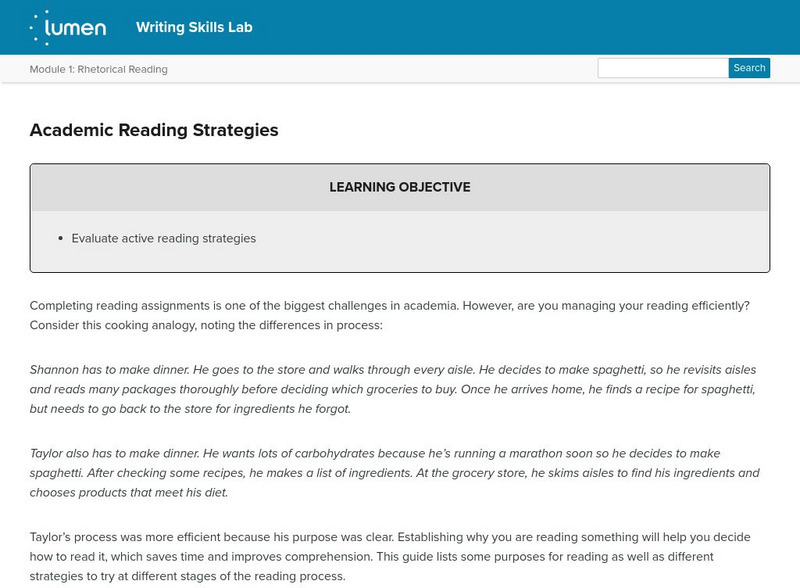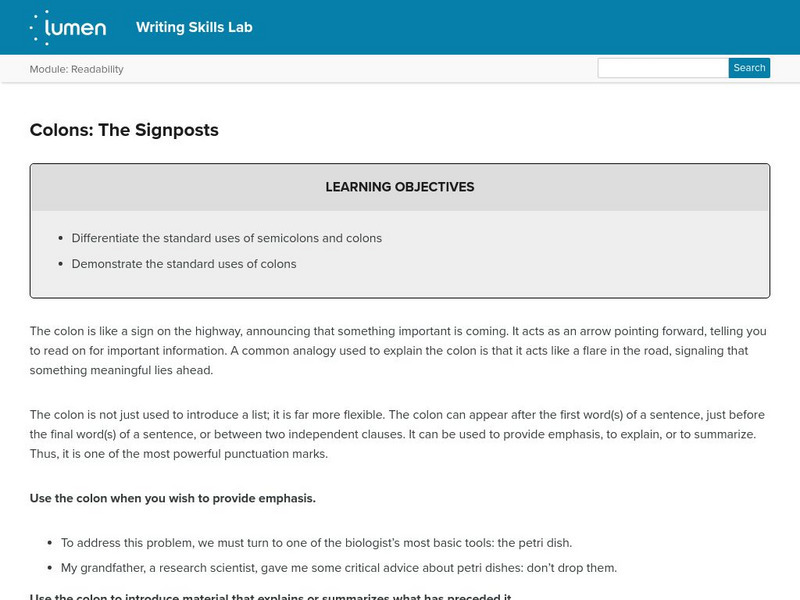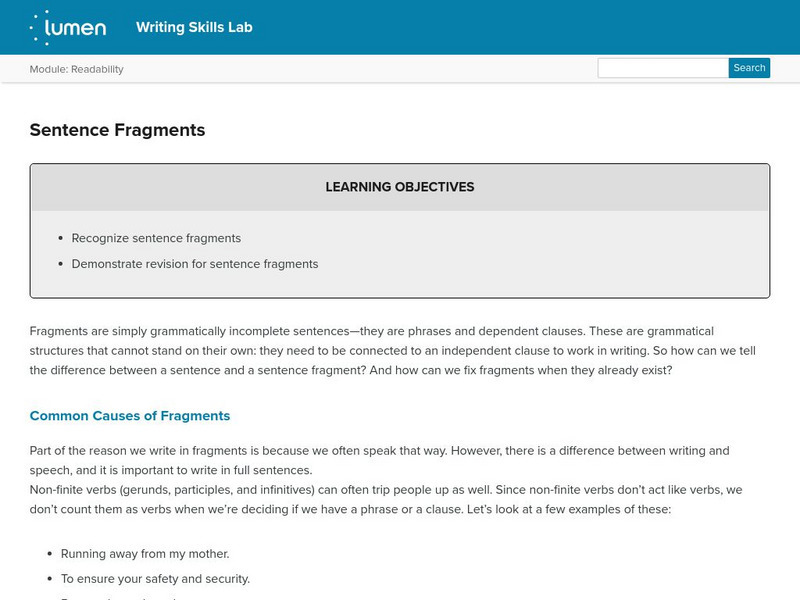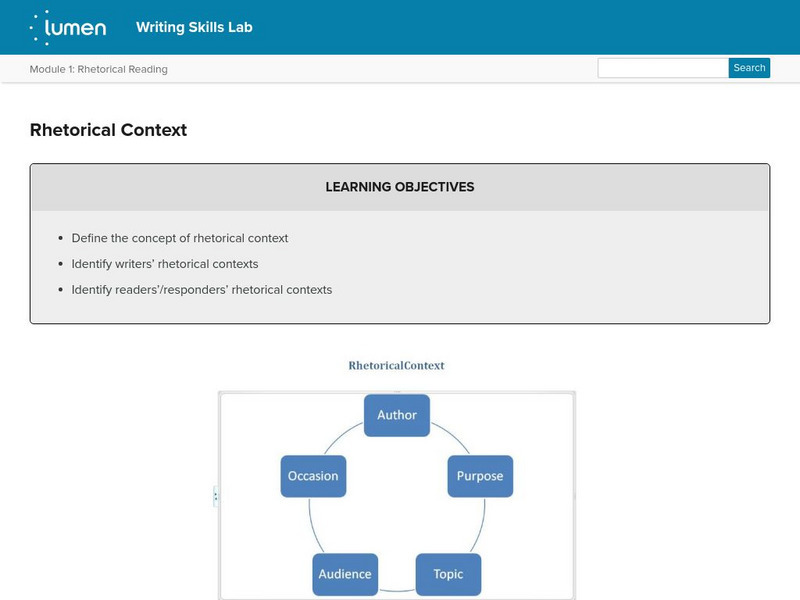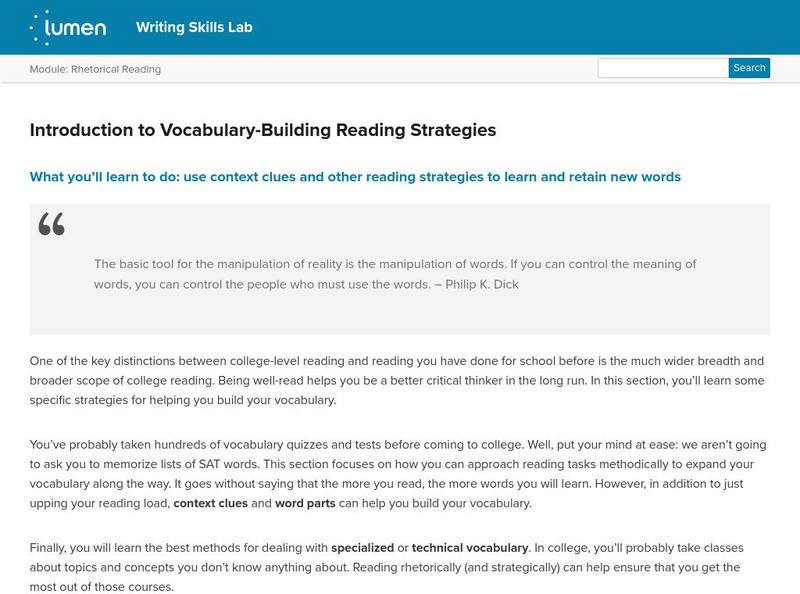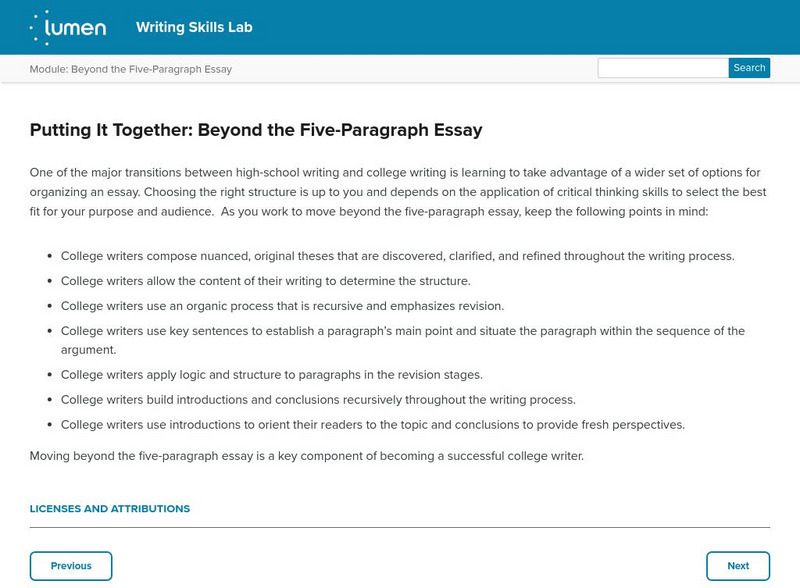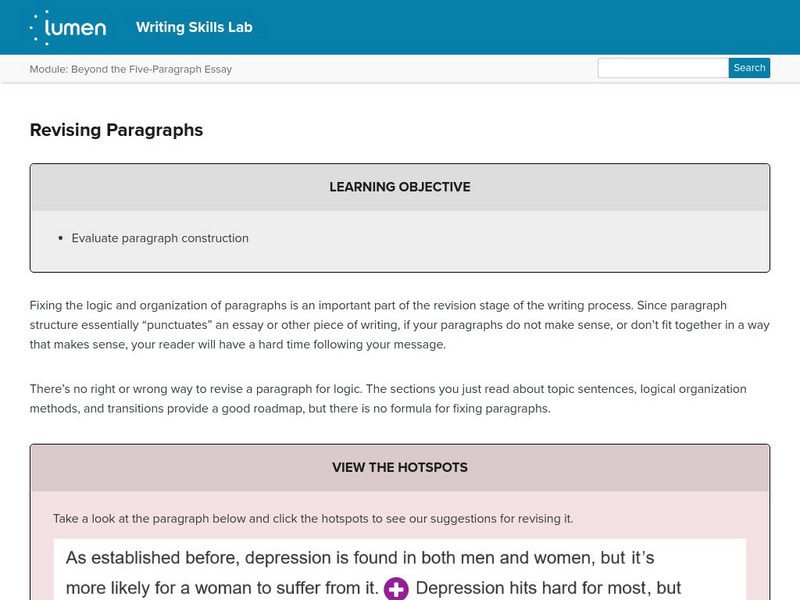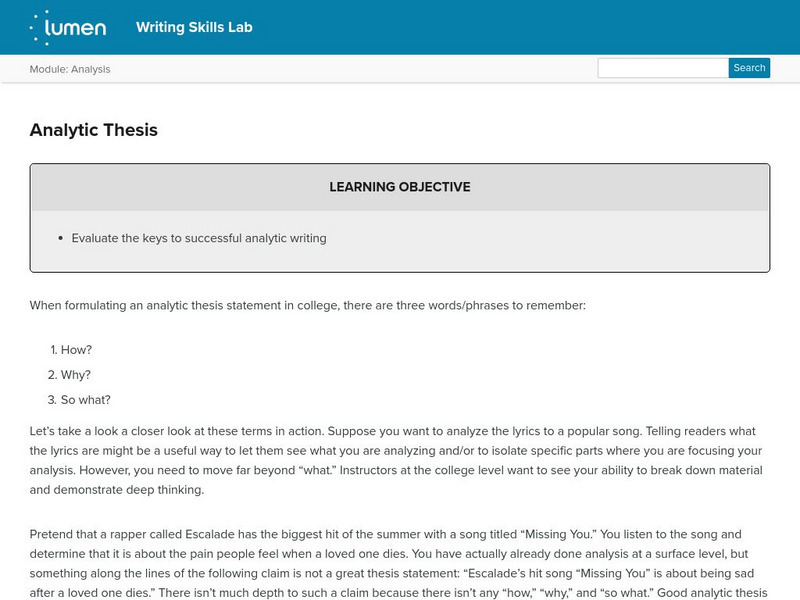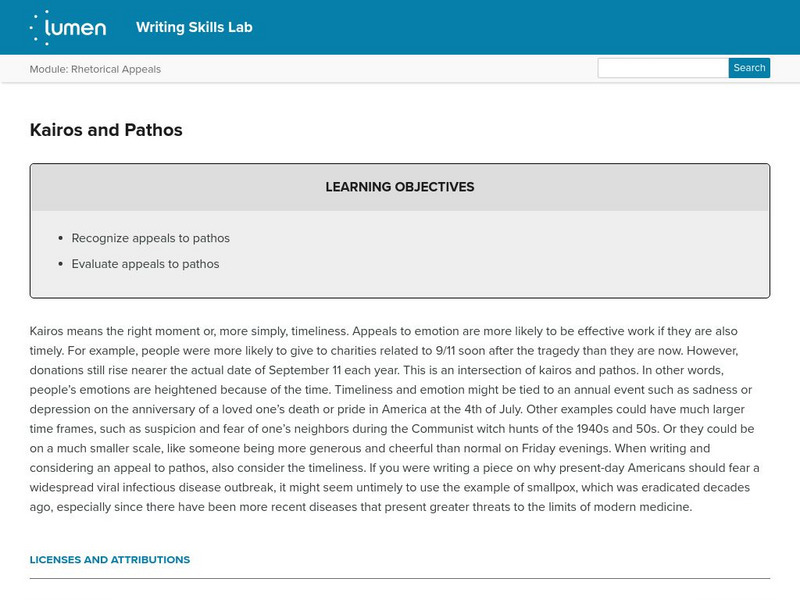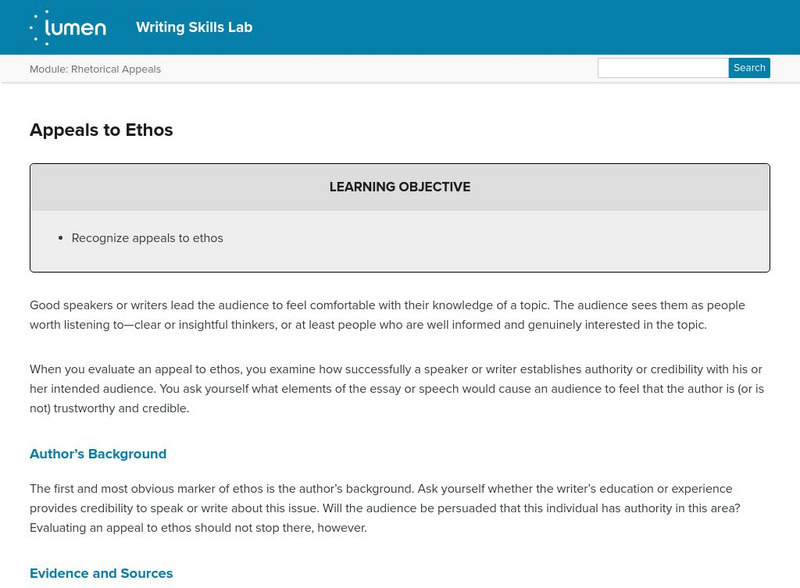Lumen Learning
Lumen: Rhetorical Reading: Academic Reading Strategies
This lesson focuses on reading strategies including understanding your purpose, and before, during, and after reading strategies.
Lumen Learning
Lumen: Readability: Colons: The Signposts
This instructional activity focuses on the differentiating the standard use of semicolons and colons and demonstrating the standard use of colons. It also provides a practice activity.
Lumen Learning
Lumen: Readability: Run on Sentences
This instructional activity focuses on recognizing run-on sentences and demonstrating revision for run-on sentences. It discusses common causes of run-ons and ways to fix them, as well as, a practice activity.
Lumen Learning
Lumen: Readability: Sentence Fragments
This lesson focuses on recognizing sentence fragments and demonstrating revision for sentence fragments. It discusses common causes of fragments and ways to fix them, as well as, providing practice activity.
Lumen Learning
Lumen: Rhetorical Reading: Rhetorical Context
This lesson focuses on rhetorical context including defining it, questions to ask to understand it, and how it can be useful to the reader and responder.
Lumen Learning
Lumen: Rhetorical Reading: Practice: Rhetorical Context
This is a practice activity to see if students can identify the writer's rhetorical context.
Lumen Learning
Lumen: Rhetorical Reading: Intro to Vocabulary Building Reading Strategies
This article explains in general how to build vocabulary using reading strategies such as context clues.
Lumen Learning
Lumen: Rhetorical Reading: Read Strategically: Retain New Words
This lesson plan focuses on strategies to retain new words such as reading voraciously, use a good dictionary and thesaurus, use new words, and learn a new word every day. It also provides an annotated biography of resource material.
Lumen Learning
Lumen: Rhetorical Reading: Read Strategically: Diversify Your Vocabulary
This lesson plan focuses on strategies to diversify and retain new vocabularies such as reading a variety of types of writing and learning roots, suffixes, prefixes, and the etymology of words.
Lumen Learning
Lumen: Rhetorical Reading: Putting It Together: Rhetorical Reading
This is a summary of the previous lessons having to do with rhetorical reading including rhetorical context, previewing text, actively reading, using context clues, and reading voraciously.
Lumen Learning
Lumen: Writing Skills: Formulaic vs. Organic Structure
This lesson focuses on the difference between formulaic writing such as the five-paragraph essay and an organic structure that puts forward an arguable statement.
Lumen Learning
Lumen: Writing Skills: Introductions
This activity focuses on identifying and evaluating strategies for writing introductions.
Lumen Learning
Lumen: Writing Skills: Conclusions
This lesson plan focuses on strategies for writing effective conclusions. It provides a list of strategies and a sample essay.
Lumen Learning
Lumen: Putting It Together: Beyond the Five Paragraph Essay
This lesson focuses on strategies for moving essay writing beyond the five-paragraph essay structure to one whose structure is determined by the content. W.11-12.4 Clear/Coherent Writing
Lumen Learning
Lumen: Writing Skills: Possessives
This lesson plan focuses on recognizing and demonstrating the standard use of apostrophes when using both singular and plural. It also provides a practice exercise.
Lumen Learning
Lumen: Writing Skills: Paragraph Transitions
This lesson focuses on transitioning between paragraphs including when to begin a new paragraph and transitions for different purposes.
Lumen Learning
Lumen: Writing Skills: Revising Paragraphs
This lesson focuses on evaluating the structure of paragraphs and revising them.
Lumen Learning
Lumen: Analysis: Critical Analysis
This lesson focuses on critical analysis including a definition, a discussion of the three types of structure for critical analysis, and a practice activity.
Lumen Learning
Lumen: Analysis: Putting It Together: Analysis
This lesson focuses on analysis including an understanding of what analysis is, the keys to effective analysis, and the types of analytic assignments.
Lumen Learning
Lumen: Rhetorical Appeals: The Star Criteria
This lesson focuses on the STAR Criteria for evaluating appeals to logos; it includes evaluating for Sufficiency, Typicality, Accuracy, and Relevance.
Lumen Learning
Lumen: Rhetorical Appeals: Kairos and Logos
This lesson focuses on the 4th logical appeal called Kairos, a time when conditions are right for the accomplishment of a crucial action; the opportune and decisive moment.
Lumen Learning
Lumen: Analysis: Analytic Thesis
This lesson focuses on the forming an analytic thesis statement that includes the how, why, and so what of the subject. It also discusses the need to let the thesis develop naturally and be sure that the main claim is reasoned.
Lumen Learning
Lumen: Rhetorical Appeals: Kairos and Pathos
This lesson focuses on appeals that use both Kairos and Pathos, appeals to emotion (pathos) are more likely to be effective work if they are also timely (kairos).
Lumen Learning
Lumen: Rhetorical Appeals: Appeals to Ethos
This lesson plan focuses on appeals to Ethos, When you evaluate an appeal to ethos, how successfully a speaker or writer establishes authority or credibility with his or her intended audience. You ask yourself what elements of the essay...


